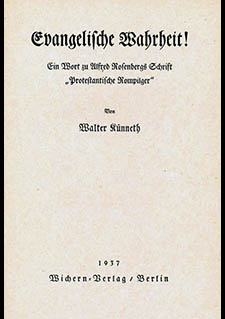Opposition to Alfred Rosenberg
Alfred Rosenberg, “The Führer’s Commissioner for the Supervision of the NSDAP’s Overall Intellectual and Ideological Training and Education” since 1934, had forced the churches into an intense debate with his belief in an anti-Christian racial myth in 1930 with his book “The Myth of the Twentieth Century”.
Rosenberg experienced strong opposition especially from Catholics. The Congregation for the Doctrine of the Faith placed his “Myth” on the Index in February of 1934. In 1934-35, theologians at the University of Bonn drafted the “Studies of the Myth of the Twentieth Century” in which they reproached Rosenberg for a multitude of historical errors and stated that his religious ideas hardly retained anything of the substance of Christianity.
Walter Künneth’s book “Antwort auf den Mythus. Die Entscheidung zwischen dem nordischen Mythus und dem biblischen Christus” (Response to the Myth. The Decision between the Nordic Myth and the Biblical Christ” of 1935 particularly stood out among the numerous Protestant rebuttals of Rosenberg. It was authorized by the church and went through three editions in a few months.
Very little separated Künneth’s anti-Semitism from Rosenberg’s though. Among other things, he explained that Rosenberg had made quite correct observations with his characterization of the destructive influence of decadent international Jewry and its threat to German cultural life (67).
Rosenberg responded to his Protestant critics with his polemic “Protestantische Rompilger. Der Verrat an Luther und der ‘Mythos des 20. Jahrhunderts’” (Protestant Pilgrims to Rome. The Betrayal of Luther and the ‘Myth of the Twentieth Century’”) of 1937. A retort penned by Künneth, “Wider die Verfälschung des Protestantism” (Against the Misrepresentation of Protestantism), was confiscated by the Gestapo before its publication.
Künneth managed however to publish his lecture “Evangelische Wahrheit! Ein Wort zu Alfred Rosenbergs Schrift ‘Protestantische Rompilger’” (Protestant Truth! A Wort on Resenberg’s Treatise ‘Protestant Pilgrims to Rome’) as a brochure instead, which was symbolically dated to Reformation Day of 1937. Among other things, it asserted that Rosenberg’s treatise was a major attack on everything sacred to Protestant Christians since the days of the Reformation and a clear sign of the enmity against the church (5).
The “Protestant Pilgrims to Rome” and Rosenberg’s provocative remark at the NSDAP’s Nuremberg Party Rally in September of 1937 that the German Volk was not inherently sinful, but rather inherently noble provoked opposition from other Protestant circles.
Around one hundred church leaders who were not German Christians sent Hitler a statement at the end of October of 1937 in which they asserted that the Nazi weltanschauung as advocated by Alfred Rosenberg was irreconcilable with the Christian faith. When the intention is to allow the weltanschauung of Rosenberg’s “Myth” and the ‘political church of National Socialism’ to replace Christianity, they would nonetheless not cease to bear witness the Gospel of Jesus Christ, the message of the Bible and the Reformation of humankind’s sin and God’s grace to our nation. (Kirchliches Jahrbuch 1933-44, p. 211ff.)
Source / title
- © Ev. Arbeitsgemeinschaft für Kirchliche Zeitgeschichte München, KK B 630:14

